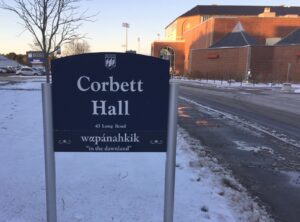Relationships With Nature Encourage A Responsibility To Be Sustainable
By Jojo Picone ’23
The Stillwater River, a channel of the Penobscot River, is well known to students at the University of Maine as a place to swim, raft, and relax when the weather is warm enough. Upstream is Orson Island and Indian Island that belong to the Penobscot Nation. The Penobscot Nation is one of the four indigenous Wabanaki tribes in Maine, and the Penobscot River is central to Penobscot culture and identity. However, due to the unsustainable practices of people outside of the Penobscot Nation, parts of the Penobscot River are contaminated with Mercury and other contaminants. Almost 50 years after the Clean Water Act, some parts of the river remain unsafe for fishing or even swimming. Solving this pollution problem involves learning sustainable practices from the Wabanaki tribes and including the Wabanaki people in policy-making.

Sustainability is integral to the culture of the Wabanaki tribes, and so it is central to the Native American Studies (NAS) courses offered at the University of Maine. In her courses, Associate Professor of Anthropology and Native American Studies Lisa Neuman describes how sustainability “also involves culture, not just natural resources.” For example, the Ash tree, which can be useful in making baskets, is part of Wabanaki creation stories. Recently, the protection of this Wabanaki keystone species has become a major concern. Chair of Native American Programs Darren Ranco is currently doing research on the Emerald Ash Borer, an invasive species that is devastating Ash trees throughout Maine. Because of the cultural and spiritual connections between Wabanaki people and the Ash tree, Dr. Ranco explains, “[Wabanaki] people address the impacts or the harms created towards [the Ash tree] in a slightly different rubric than cost-benefit analysis or ecological health.” This is because it is a part of Wabanaki culture to recognize the relationships humans have to nature and treat nature as one would treat one’s relations. Connections with nature highlight the value of preserving it and inspire sustainable thinking.

For students interested in learning about Wabanaki cultures and indigenous sustainability practices, the Native American Program has many courses and resources (including the WaYS program) available for both native and non-native students. Courses such as Introduction to Native American Studies provide a great overview of Wabanaki culture. A key to sustainability is communication, and the course Wabanaki Languages is an introduction to the languages of many Wabanaki Tribes. Whether or not students take a course through the Native American Program, engaging with Wabanaki culture brings a sense of orientation and an opportunity to reflect upon the history of this land where we study, eat, sleep, and play.
